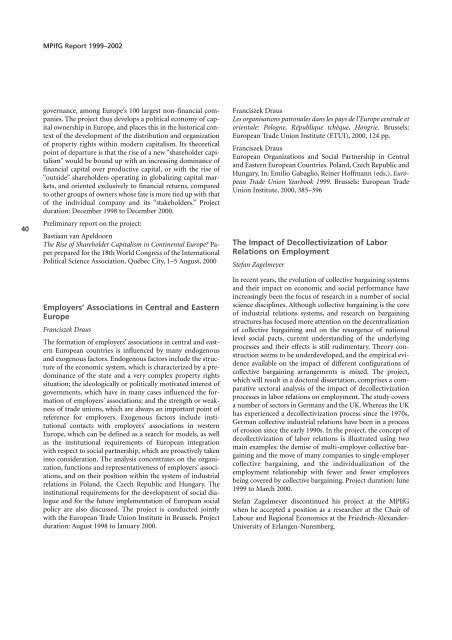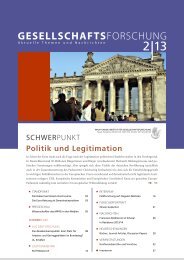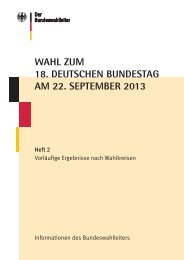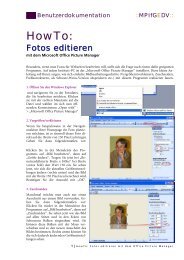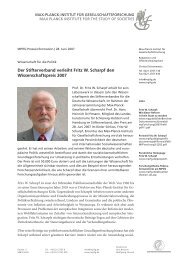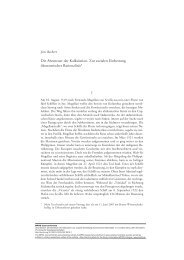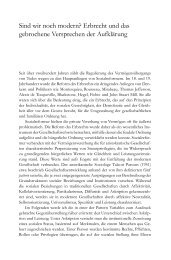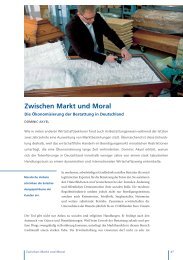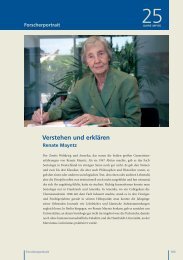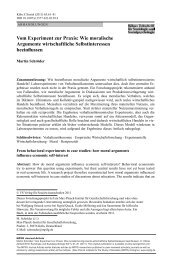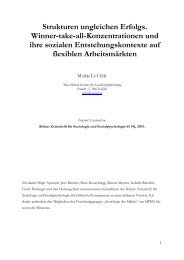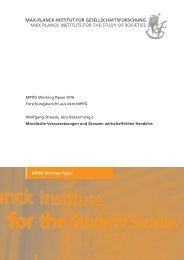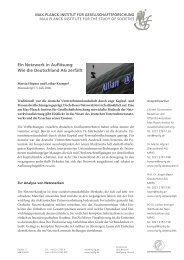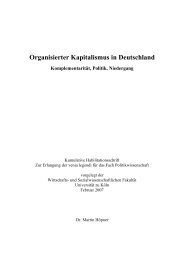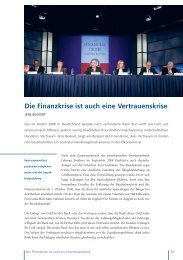Publications - MPIfG
Publications - MPIfG
Publications - MPIfG
You also want an ePaper? Increase the reach of your titles
YUMPU automatically turns print PDFs into web optimized ePapers that Google loves.
40<br />
<strong>MPIfG</strong> Report 1999–2002<br />
governance, among Europe’s 100 largest non-financial companies.<br />
The project thus develops a political economy of capital<br />
ownership in Europe, and places this in the historical context<br />
of the development of the distribution and organization<br />
of property rights within modern capitalism. Its theoretical<br />
point of departure is that the rise of a new “shareholder capitalism”<br />
would be bound up with an increasing dominance of<br />
financial capital over productive capital, or with the rise of<br />
“outside” shareholders operating in globalizing capital markets,<br />
and oriented exclusively to financial returns, compared<br />
to other groups of owners whose fate is more tied up with that<br />
of the individual company and its “stakeholders.” Project<br />
duration: December 1998 to December 2000.<br />
Preliminary report on the project:<br />
Bastiaan van Apeldoorn<br />
The Rise of Shareholder Capitalism in Continental Europe? Paper<br />
prepared for the 18th World Congress of the International<br />
Political Science Association, Québec City, 1–5 August, 2000<br />
Employers’ Associations in Central and Eastern<br />
Europe<br />
Franciszek Draus<br />
The formation of employers’ associations in central and eastern<br />
European countries is influenced by many endogenous<br />
and exogenous factors. Endogenous factors include the structure<br />
of the economic system, which is characterized by a predominance<br />
of the state and a very complex property rights<br />
situation; the ideologically or politically motivated interest of<br />
governments, which have in many cases influenced the formation<br />
of employers’ associations; and the strength or weakness<br />
of trade unions, which are always an important point of<br />
reference for employers. Exogenous factors include institutional<br />
contacts with employers’ associations in western<br />
Europe, which can be defined as a search for models, as well<br />
as the institutional requirements of European integration<br />
with respect to social partnership, which are proactively taken<br />
into consideration. The analysis concentrates on the organization,<br />
functions and representativeness of employers’ associations,<br />
and on their position within the system of industrial<br />
relations in Poland, the Czech Republic and Hungary. The<br />
institutional requirements for the development of social dialogue<br />
and for the future implementation of European social<br />
policy are also discussed. The project is conducted jointly<br />
with the European Trade Union Institute in Brussels. Project<br />
duration: August 1998 to January 2000.<br />
Franciszek Draus<br />
Les organisations patronales dans les pays de l’Europe centrale et<br />
orientale: Pologne, République tchèque, Hongrie. Brussels:<br />
European Trade Union Institute (ETUI), 2000, 124 pp.<br />
Franciszek Draus<br />
European Organizations and Social Partnership in Central<br />
and Eastern European Countries. Poland, Czech Republic and<br />
Hungary. In: Emilio Gabaglio, Reiner Hoffmann (eds.), European<br />
Trade Union Yearbook 1999. Brussels: European Trade<br />
Union Institute, 2000, 385–396<br />
The Impact of Decollectivization of Labor<br />
Relations on Employment<br />
Stefan Zagelmeyer<br />
In recent years, the evolution of collective bargaining systems<br />
and their impact on economic and social performance have<br />
increasingly been the focus of research in a number of social<br />
science disciplines. Although collective bargaining is the core<br />
of industrial relations systems, and research on bargaining<br />
structures has focused more attention on the decentralization<br />
of collective bargaining and on the resurgence of national<br />
level social pacts, current understanding of the underlying<br />
processes and their effects is still rudimentary. Theory construction<br />
seems to be underdeveloped, and the empirical evidence<br />
available on the impact of different configurations of<br />
collective bargaining arrangements is mixed. The project,<br />
which will result in a doctoral dissertation, comprises a comparative<br />
sectoral analysis of the impact of decollectivization<br />
processes in labor relations on employment. The study covers<br />
a number of sectors in Germany and the UK. Whereas the UK<br />
has experienced a decollectivization process since the 1970s,<br />
German collective industrial relations have been in a process<br />
of erosion since the early 1990s. In the project, the concept of<br />
decollectivization of labor relations is illustrated using two<br />
main examples: the demise of multi-employer collective bargaining<br />
and the move of many companies to single-employer<br />
collective bargaining, and the individualization of the<br />
employment relationship with fewer and fewer employees<br />
being covered by collective bargaining. Project duration: June<br />
1999 to March 2000.<br />
Stefan Zagelmeyer discontinued his project at the <strong>MPIfG</strong><br />
when he accepted a position as a researcher at the Chair of<br />
Labour and Regional Economics at the Friedrich-Alexander-<br />
University of Erlangen-Nuremberg.


